
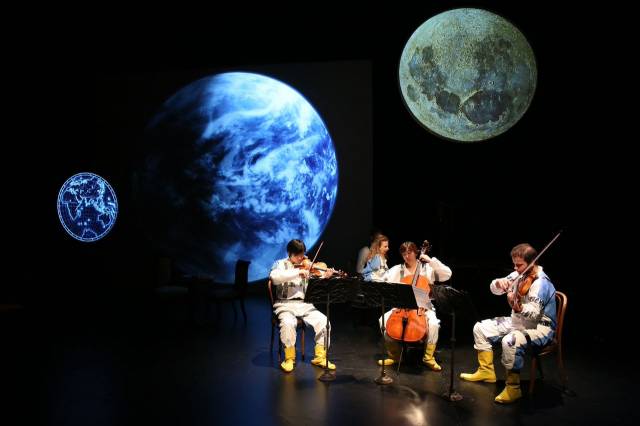
Sitting down to talk with Eve Wolf, writer and pianist of Jules Verne: From the Earth to the Moon is a fascinating lesson in history, music and film. The story of this theatrical concert comes from a brief meeting between the famed French author of Around the World in Eighty Days and young American journalist Nellie Bly, who attempted to break the 80-day record for traveling around the world set by Verne’s own fictional character, Phileas Fogg. With soaring chamber music and footage of space weaved throughout this tremendous story, Wolf beautifully captures a slice of history. I had a chance to sit in the intimate BAM Fisher theatre after the performance and speak with Wolf about this unique show.
I was very struck by the imagery of this show and how beautiful it is. It’s very impressive, particularly this circular set piece over here that I’m pointing to that projected the moon.
Eve Wolf: And it looked three-dimensional.
It looked so realistic. It’s amazing. Who is responsible for putting together the footage and all the imagery and how is that put together?
David Bengali was our video designer but we had done this production one time in 2008 with other footage and so we built on some of those ideas but then it was completely expanded. The basic idea is that there’s a combination of historic film such as George Méliès’ 1902 film Le voyage dans la lune, and things from the '60s. There are lots of Cape Canaveral and gorgeous rockets and bottoms of rockets and Hubble photos as well. So it’s kind of a combination but with a real aesthetic of mixing; sometimes there was even overlay between the Méliès and the '60s. That’s why we were also in space suits. Jules Verne was seeing the future and in his novel, From the Earth to the Moon, he actually talked about the blast-off being in Florida and Tampa. There were lots of things he predicted. So there was a play on that with Cape Canaveral and so on.
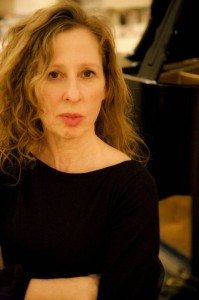
That’s so fascinating.
We had a wonderful video designer, David Bengali, but it was a team effort because video is also a very musical statement, video has to have a connection to the music as it’s going on. That doesn’t mean it’s a one-to-one correspondence where it beats with the music or necessarily changes with the bar line. It means that it really takes a musical and a narrative understanding to choose the video. So we sat with the director Donald Sanders, who’s interpreting my script with the video designer. I’m a musician, so I would interject about the musical aspect of it. We’d all come up with different images. Don is vastly cultured, so we’d have the images and we would readjust depending on musical ideas or narrative ideas. We really have a team. We think as a team.
I’m not as familiar with this idea of melding the chamber music and the theatrics.
We call it a theatrical concert. We’ve done over 40 of these. What is the idea? Well, it’s hard to put it into words. In a way, music does tell a story already. It’s got narrative content. It also has connections with real historic events. Even as a child, as I played the piano, I had stories in my head because to me the music is speaking to me. I felt that this was a portal because I love music history so much. In this case it wasn’t [as much about music history] -- we did Tchaikovsky for example last year, but this wasn’t a musical figure — but everything has a musical connection from the milieu in which it springs up in one way or another. The music is unconsciously of its time. Everything is of its time. So the music isn’t here to decorate, it’s not background music, it’s not side music, it is part of the story. You hear a story in the music. This music I particularly chose also because it has a kind of a film quality to it, [Ernest] Chausson especially. A lot of the film composers copied him like John Williams, you know that sound.
I detected some cinematic notes. It’s very familiar sounding.
Yeah, like Star Wars, it’s these faraway harmonies that sound intergalactic. It was the era of the beginning of film. For me, these particular pieces are very well set with film. I wouldn’t do it with Beethoven, you can’t do it with everything. This was just the time.
How do you conceptualize and write a piece; do you have the story first and then overlay the music or is it the music that allows the story to take shape?
No, it’s all at the same time. I’m sitting there and I usually try to find the beginning or the end of the script and as I do that I immediately start thinking about the music at the same time. It’s always in my head. So it’s really not a separate process at all and that’s why I pride myself on it being very integrated. I didn’t slip this music in later. It pushes the story forward, it’s emotional.
So, for example, in the second half when [Jules Verne] says, “I don’t count in French literature. I’ve been passed over.” This is a funny piece, it’s lighter than a lot of things we do but in a way it’s very serious because it’s really about Jules Verne being just like all of us, he’s getting old, he’s going to die, but his imagination is big. He can’t travel -- he didn’t travel that much -- he’s sick, he works in a teeny room. The only thing that saves him is his art, sublimation. So this frail human being has this giant imagination and he sees a girl who’s sort of his torchbearer, who goes into the future. There’s poignancy; it’s sad, it’s this passing of the two people. It’s very brief, nothing really happens except they meet. He does follow her after that. She does, after that, marry someone Jules Verne’s age. You kind of wonder. They were very taken with each other.
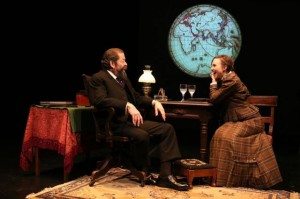
But it’s ultimately about getting old and dying and art. It’s about art. Because in the end, what do we have but he wrote the books? But he stayed in a teeny little room with unbelievably obsessive copying, recopying and working and working. In a tiny room with a little military bed and the same routine every day. He went to the same café every day, he went to the library every day. Everything he did was in this little routine of work. He went all over the world in his mind. And that’s what I love about it. She boldly went around the world and she’s an incredible figure because, you know, she put herself in an insane asylum. She’s an amazing personage but, in a way, for me the story is about the art. It’s what he created. Even though he didn’t go anywhere. He didn’t go to that many places.
The story of Nellie Bly is quite unusual not only for its time but even for this time. She was so young, and such a small, petite woman. And the meeting between her and Jules Verne is quite extraordinary. Have you always been interested in these sort of niche historical events?
I am interested in history but I’m also interested in the present too. We did The Dreyfus Affair, so that’s a political event. I’m interested in things that touch on women’s struggles, biographical things like the Tchaikovsky was about him hiding his homosexuality, just whatever strikes me. And then art, musicologists also write scripts, it’s whatever we feel passionate about. There’s so many things that interest me. This is, by the way, just so you know, about 95% primary source. These are their real words. Even the fighting between the two of them.
And the newspaper headlines?
Yes, they’re all real. I took some liberties but I based it on interviews and some speech patterns but not too many.
What do you think Nellie Bly’s real motivations were in pursuing this? You don’t go into that much depth to her character onstage, there’s not much time, but did she just admire Jules Verne’s writing that much or did she just want to be a good reporter?
I think she was really a muckraking reporter and she wanted to do spectacular things and one side of this piece is the fact that it’s a media event. It was one of the biggest media events that had ever happened before. This is the first time you have the telegraphs and the newspapers and all this communication. Around the world, all those articles said, “Nellie drank wine and he had cake” and they followed every single step of her voyage and the story. And about Honorine [Verne’s wife] and what they did, and that she kissed her; everything was documented. I think for Nellie this was probably the people who underwrote this wanted her to meet Jules Verne, she probably admired him too. But it was all part of a planned media campaign. And it was followed all over, probably there were advertisers too. I think given her history of muckraking, I think this was all part of this tremendous media event. Also, Don likes to say she really wanted to survive, she needed to make a living too. She was really a woman who was going to make a living and she was in favor of the women’s vote and she was basically ahead of her time too. He was predicting things ahead of his time, she was a woman ahead of her time. Later, she married someone much older but she ran this big company, she was an industrialist, later she went bankrupt, I think she adopted a child right before she died. Very interesting life. But yes, I did not present her in all her depth because it wasn’t about that.
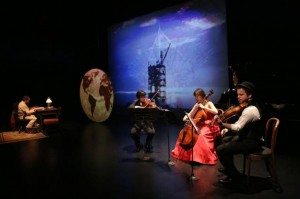
The show was first performed in 2008. Has the production changed much since that first iteration?
Yes, it’s changed a lot. I rewrote the script. Lots of things changed and the video design also changed. The set was this beautiful. I love this set. That’s Vanessa James. It’s very elegant. Technology has improved in the last eight years so we have better projectors, we have better technological things. But I didn’t get to see it. (Laughs) That’s sad. Because I’m back there. But I like being part of it. Then you’re really part of the company.
Are you Musical Director as well?
It’s not really like that. These are fabulous chamber musicians. We have rehearsals, we discuss, it’s really democratic. And we feel things together, it’s by discussion, not by direction in this small of a group. These are really wonderful musicians to work with. We added the barbershop quartet, that’s new.
That was an amazing number with the four of them.
Barbershop quartets were all the rage back then. That song “Nellie Bly,” that’s where she took her name from. That’s why I had that song in there. Stephen Foster wrote the song and that was her pen name, Nellie Bly. And so that’s connected. And then the [Jacques] Offenbach song is from Le voyage dans la lune, it was sort of ripped off of Jules Verne. In fact there was a lawsuit. That was about the moon because it was taken from his novel. We never put anything haphazardly. And [Cécile] Chaminade is a woman, I thought of her as the female counterpoint to Chausson.
There are so many specific details that you can really appreciate in this piece.
But it is a new form that we’re working on. It’s not a musical exactly but there are 65-70 minutes of music in here. It’s full concert length. The music advances the story.
I liked that the spoken words didn’t seem out of place, they seemed very melded gently into the music. But I really felt that the music took center stage. The music and the images were what was really prominent for me.
It’s not really a play. In a way it’s more like a screenplay but that music and image becomes — you know like in a movie how a lot is visual? We don’t always do visual but even just sound. You travel through time through music also. Time and emotion happens. Music always has a narrative. Sometimes I conceive of this as a silent movie. In the beginning there was a quote and then in the end it said what happened. There was this feeling developed by the director, this idea that some of this music really feels cinematic.
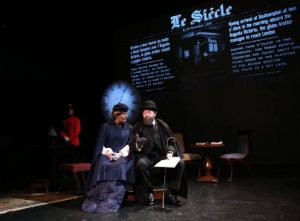
It does. I like the format a lot because I love classical music and I love film and theatre. So it’s kind of combining everything altogether.
One of my goals was also that when I really founded this I started to realize that people weren’t listening that well in concerts. I often noticed that. People are sitting there unwrapping candy and coughing a lot. I don’t feel like people are engaged. But music is very engaging. But in this format where you set it either historically or like we just did a piece this summer about Beethoven. People listen differently and it allows some people to get into that door and listen to chamber music a little differently.
Hopefully it introduces chamber music to a whole new audience.
That’s one of my missions actually. Chamber music is very gripping. It’s very intense. Sometimes people think of it as fuddy duddy, like a quartet, very intellectual or effete. But it’s not, it’s very immediate and emotional. I’ve had people come up to me and say, “I want to get a recording of that. What was that piece?” And then they start listening to the music. So that’s really important to me.
You’ve covered Tchaikovsky, Chopin, Van Gogh, Oscar Wilde, and Tolstoy. Who would you like to create a show about next?
I hope to be doing one on Kafka this coming year. There are lots of ideas in the pipeline. There are so many things I want to do.
Will it be the same kind of format with the video?
No, the Kafka would have no video whatsoever. I want to be careful not to get into any kind of mold or pattern. I try really hard not to. The Kafka might just be one person maybe talking to himself or maybe with puppets. It wouldn’t lend itself to film. But I am very interested in the visual and film absolutely. With music I really do like imagery. It’s dangerous because it can sometimes take away. Next year, we’re talking about doing a fantasy, science fiction, and fables. I’ve already started writing a script about Metropolis. That will definitely be with film. But it may be turned into a ballet but with a rewritten ending. With live music. I’ve already sketched that out. I think James Melo (Musicologist) is going to be doing Through the Looking Glass.
So you don’t focus on any one art. You like the historical figure, literary figures and musical figures, artists as well.
Artists as well and writers. I would even do an historical event. I had done a proposal for the U-2 incident for example, which is about this spy plane that goes into Russian territory. It’s a very 60’s subject matter. It could be about a fictional person that’s from literature. It doesn’t have to be biographical. Or it can be poetry. We like to experiment. So we’ll see what comes out of that.
"Jules Verne: From the Earth to the Moon" is performed through April 12 at BAM Fisher.